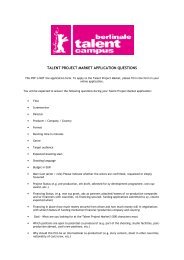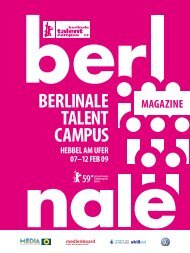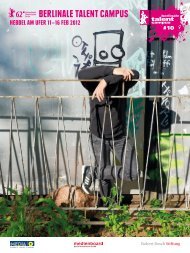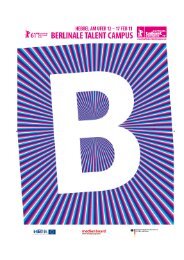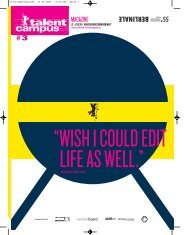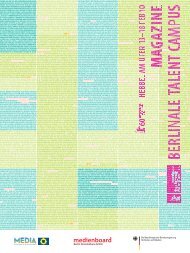magazine berlinale talent campus - Berlinale Talent Campus - Top-ix
magazine berlinale talent campus - Berlinale Talent Campus - Top-ix
magazine berlinale talent campus - Berlinale Talent Campus - Top-ix
You also want an ePaper? Increase the reach of your titles
YUMPU automatically turns print PDFs into web optimized ePapers that Google loves.
Page <strong>Campus</strong> programme<br />
62<br />
the Great World of Sound<br />
Master class with Michael Nyman.<br />
Moderated by Peter Cowie.<br />
17:00 | Hau 1<br />
Scoring for film is not a solo venture, but rather a collaborative<br />
project that requires a comprehensive understanding of the film and<br />
the aim of the filmmaker, envisaging it from a sonic perspective before<br />
bringing it to life. That’s what most people are familiar with visàvis<br />
the music of Michael nyman – the distinguishing style of his film<br />
scores. Having worked as a film composer for over 30 years, he has<br />
composed a string of notable scores for over ten films of British art<br />
house director Peter Greenaway, several Michael Winterbottom films,<br />
and of course the astounding music for Jane Campion’s THE PIAnO.<br />
But nyman is more than just a film composer – with over 300 works<br />
only ten percent are film scores. He is also a conductor, composer,<br />
leader of the Michael nyman Band, photographer and filmmaker. In<br />
this master class, nyman will explore ideas behind the tension which<br />
exists between music/soundtrack composing, sound effects and<br />
mov ing and still images, and how all of these interact and affect each<br />
other in the completion of a film. Showing excerpts from his own films<br />
as well as the commercial films he has scored, he will talk about his<br />
approach and understanding of soundtrack composing from the<br />
perspective of a visual artist and filmmaker.<br />
Why Poverty?<br />
don edkins and Hans robert eisenhauer.<br />
17:00 | Hau 2<br />
Myriad films have been made on poverty but a large pro portion<br />
of them are stereotypical approaches often seen on television.<br />
Experts call them “development porn“ as images of passive help lessness<br />
and deprivation are easy to absorb and easier to ignore. “Why<br />
Poverty?” aims to initiate a global dialogue on poverty through public<br />
media, challenging people to participate and come up with their own<br />
solu tions to eradicate poverty. This crossmedia project, launched by<br />
Don Edkins, executive producer of the HIV/Aids project “Steps for the<br />
Future” and “Why Democracy?”, will comprise eight onehour and<br />
thirty short documentary films to be distributed via innumerable<br />
inter national broadcasters, the internet and mobile platforms during<br />
a theme week in 2012. The films will depict how people find ways<br />
to overcome and fight poverty in daily life, fostering the belief that<br />
things can improve if we set our minds to it. Don Edkins will explain<br />
the underlining concept and the objectives of the project, the broad<br />
themes related to poverty under which the films will be made, and<br />
the process of applying with short film ideas, which can be submitted<br />
by interested <strong>Talent</strong>s from February 2011. Joining him on stage is<br />
coinitiator Hans Robert Eisenhauer (ZDF/ARTE), who will ela borate on<br />
the process of initiating a project of this size and scale.<br />
WedNeSday, feb 16<br />
Happy returns: the future after the <strong>Campus</strong><br />
rosario García-Montero, Kaspars Goba<br />
and Javier fuentes-León.<br />
In cooperation with <strong>Berlinale</strong> Generation, <strong>Berlinale</strong> Panorama,<br />
World Cinema Fund, <strong>Berlinale</strong> Co-Production Market.<br />
17:00 | Hau 2<br />
The ninth edition of the <strong>Campus</strong> assists filmmaking pro fessionals<br />
in their quest to position themselves in an everexpanding and<br />
fast changing world of cinema, where taking risks and facing chall enges<br />
headon is slowly becoming a matter of course. In the limelight<br />
today are <strong>Campus</strong> alumni who have been invited to the <strong>Berlinale</strong> 2011<br />
with the films or market projects they worked on since they attended<br />
the <strong>Campus</strong>. Javier FuentesLeón and Rosario GarcíaMontero will tell<br />
us how they managed to make their film projects a reality, discussing<br />
their personal and professional struggles in staying on the filmmaking<br />
path and in positioning themselves. Presenting excerpts from their<br />
films, they will elaborate on how they addressed the challenges that<br />
arose whilst taking creative and strategic decisions for their projects,<br />
decisions that have brought them back to the <strong>Berlinale</strong> with inspiring<br />
new films.<br />
Christoph Schlingensief: five favourites<br />
anselm franke, Carl Hegemann, francis Kéré,<br />
Matthias Lilienthal and Georg Seeßlen.<br />
Moderated by dorothee Wenner.<br />
In cooperation with Theater Hebbel am Ufer (HAU),<br />
Forum Expanded and Goethe-Institut South Africa.<br />
20:30 | Hau 1<br />
He was once arrested for exhibiting a poster with the words<br />
“Kill Helmut Kohl” (then chancellor of Germany), and a year later<br />
form ed a political party, Chance 2000, which urged Germans to vote<br />
for themselves in the 2000 national elections. Christoph Schlingensief,<br />
the enfantterrible of the Germanspeaking cultural scene, and certainly<br />
its bestknown artistic provocateur, passed away in August<br />
2010. An artist, film, theatre and opera director, he was tireless in his<br />
attempts to urge a critical reflection on issues such as immigration,<br />
unemployment, rights of the disabled, etc.<br />
This evening isdedicated to Christoph Schlingensief with selec<br />
ted film, photo and sound material from his work in theatre, visual<br />
art, film and opera. Five specialists, friends and companions will show,<br />
comment and discuss their favourite Schlingensief work. With Anselm<br />
Franke (curator) on “MedienKunst” (“Media Art”), Carl Hege mann<br />
(dra ma turge) on “Mea Culpa”, “Parsifal” and “Der fliegende Holländer”<br />
(“The Flying Dutch man”), Matthias Lilienthal (artistic director of<br />
HAu) on “Ausländer Raus!” (“Foreigners Out!”), Francis Kéré (architect)<br />
on the “Operndorf” (“Opera Village”) and Georg Seeßlen (film critic) on<br />
his films.




